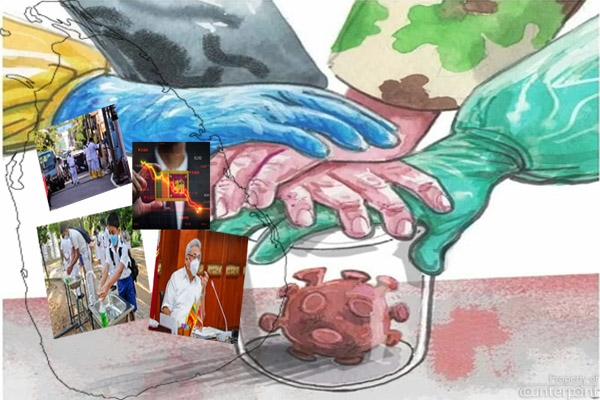The country was hailed as a ‘model’ in controlling the corona virus, particularly with limited resources. Initial fears that the country’s threadbare health system would be overrun as it happened in some European countries were not realised. The openers had started with a bang.
It was the beginning that was difficult because not even developed nations knew what should be done and many of them- such as Britain and the United States- got it horribly wrong. By being cautious, Sri Lanka had gained a head start that was the envy of the rest of the world.
The rest should have been easy. By September last year, other countries had shown the way to beat the virus: close the borders, test as much as you can and enforce quarantine and isolation whenever there are local outbreaks. All that had to be done was to consolidate on the good start.
Alas, that didn’t happen. Control of the campaign was handed over to the military. Medical opinion was marginalised. Even ruling party parliamentarian Dr. Tissa Vitarana, a virologist and ideally placed to advise the government complained that their opinions weren’t being heard.
Other were quick to get in on the act. Enter Eliyantha White, self-proclaimed physician to the first family. He wanted pots of ‘holy water’ thrown in to rivers to ward off the virus. Ministers who often act as mouthpieces for the government, Pavithra Wanniarachchi, Prasanna Ranatunga and Udaya Gammanpila are caught on camera, doing just that. Asked to explain, Wanniarachchi, who holds the portfolio of Health, is defiant. “I would even sacrifice myself like Vihara Maha Devi”, she declares in Parliament.
That is only Act One in this tragi-comedy. The stage is set for Dhammika, the charlatan unregistered practitioner of Ayurvedic Medicine who proclaims his ‘peniya’ cures the virus. Pavithra Wanniarachchi takes a gulp in front of the cameras. So does, Speaker Mahinda Yapa Abeywardena, who forgets that he is seventy-five years old and in the ‘highly vulnerable’ age group for the virus.
The people get the message, loud and clear: who needs multinationals such as Pfizer and Astra Zeneca when we have Dhammika? They flock in their thousands to Dhammika’s house to get a gulp of the elixir of life, forsaking social distancing. The Police have to be called in to control the ensuing melee.
In the meantime, case numbers slowly start to rise, initially by the dozen and then by the hundreds. The dreaded second wave has arrived. It is traced to a garment factory where foreigners were apparently allowed in. Someone, somewhere, had ruled the waves and waived the rules for quarantine.
The second wave spreads. Instead of acknowledging that there is community transmission, authorities bury their heads in the sand and say there is no community transmission. Even leading health officials do so, possibly fearing for their jobs, if they say anything to the contrary. They had already seen a Director of the Medical Research Institute sent packing after making a comment that didn’t toe the official line. Apparently, there is still-even to this day- no community transmission because all infections can be traced to the Peliyagoda fish market. That must be where the whole country buys their fish from!
The circus is not over. It is time for the clown, Udayanga Weeratunga, first cousin of the first family to embellish his CV. It is time to add ‘tourist guide’ to his already versatile list of occupations: arms dealer, ambassador, person wanted by Interpol.
Weeratunga brings a plane load of tourists from Ukraine, a country teeming with corona virus infections. They roam around the countryside with little or no restrictions. They are not asked to quarantine but locals who mingled with them are. Asked about this, State Minister Nimal Lanza screams in Parliament. “Ukrainian tourists are not crazy enough to quarantine for two weeks to tour our country for a few more days”. Of course, they are not. It is just that we are, to invite them here.
The results of all this become slowly obvious. Now we are recording some 900 infections per day- the Peliyagoda fish market is becoming busier! More than 350 people have died. Minister Wanniarachchi herself fell ill, inviting international headlines such as “Sri Lankan Minister who drank magic potion infected with corona virus”. The pandemic is relentless in its march in Sri Lanka. In cricketing parlance, it is the all too familiar collapse of the ‘middle order’- we are staring at being defeated by the virus.
All this while there has been another raging debate- not about how to beat the pandemic but about how to dispose of bodies of Muslim victims. The discussion has taken an ugly, racial tone and invited condemnation from around the globe. Yet, the government has stuck to its guns. After all, President Gotabaya Rajapaksa reminded us just last week in his Independence Day address: “I am a Sinhala Buddhist leader and I will never hesitate to state so”.
Yet, this week, there was a surprising shift, not from the President but from the Prime Minister, elder brother Mahinda. Answering queries in Parliament, he confirmed the inevitable: Muslims will be allowed to bury their dead. The last man in was putting up a defiant rear-guard action.
It is too little, too late. The damage has been done. The contest against the corona virus has already been lost. More will get infected. More will die. That is the sad, stark reality of how the pandemic was mismanaged after a successful stance against it at the start. When the history of the pandemic comes to be written, there may be a chapter on Sri Lanka: ‘How to snatch defeat from the jaws of victory’.





